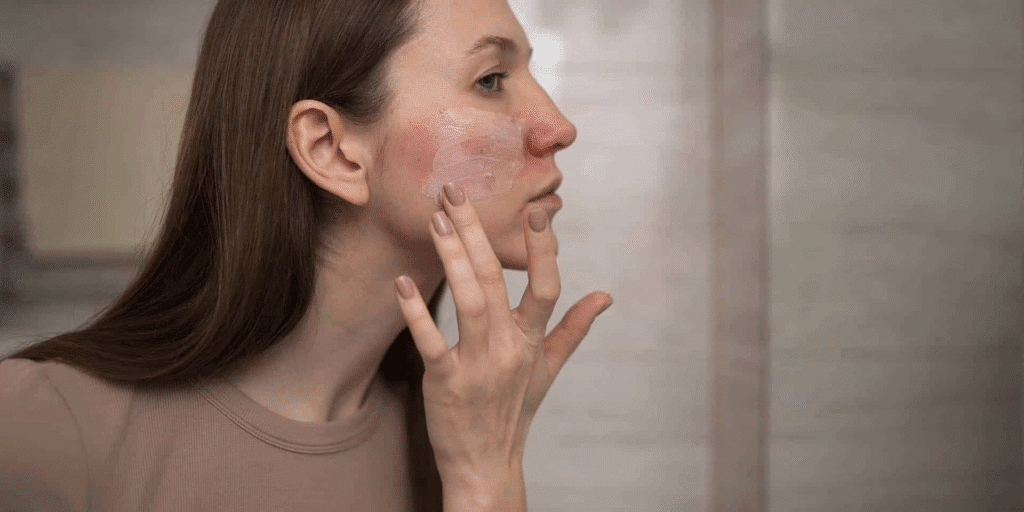Rosacea is a chronic skin condition that causes redness, visible blood vessels, and sometimes pimples on the face, especially around the cheeks, nose, and forehead. While the exact cause of rosacea isn’t fully understood, triggers such as sun exposure, spicy foods, alcohol, and stress can make the symptoms worse. If you have rosacea, it’s crucial to adopt a skincare routine that calms and soothes your skin without aggravating it. Here are 7 dermatologist-recommended skincare tips for managing rosacea.
1. Use Gentle, Non-Irritating Cleansers
When you have rosacea, your skin is more sensitive, so it’s important to choose a gentle, fragrance-free cleanser that doesn’t strip the skin of its natural oils. Opt for:
- Cream-based cleansers or micellar water that won’t leave your skin feeling tight or dry.
- Avoid exfoliating cleansers or scrubs, as they can irritate the skin and worsen rosacea symptoms.
2. Apply a Moisturizer Daily
Rosacea skin can often be dry and irritated, so hydration is key to keeping your skin healthy. Choose a fragrance-free, hypoallergenic moisturizer to help restore the skin’s moisture barrier. Look for ingredients like:
- Ceramides: Help restore and protect the skin’s natural barrier.
- Hyaluronic acid: Helps retain moisture.
- Niacinamide: Soothes inflammation and strengthens the skin barrier.
3. Protect Your Skin from the Sun
Sun exposure is a common rosacea trigger, leading to flare-ups and exacerbating redness. Dermatologists stress the importance of daily sun protection for rosacea-prone skin:
- Use a broad-spectrum sunscreen with at least SPF 30 or higher, and reapply every two hours when outside.
- Look for physical sunscreens (containing zinc oxide or titanium dioxide) as they are less likely to irritate sensitive skin than chemical sunscreens.
- Wear a wide-brimmed hat and seek shade when possible to minimize sun exposure.
4. Avoid Known Triggers
Certain environmental factors and lifestyle habits can trigger rosacea flare-ups. Identifying and avoiding these triggers can help keep symptoms under control. Common rosacea triggers include:
- Hot beverages (like coffee or tea)
- Spicy foods
- Alcohol, particularly red wine
- Extreme temperatures (hot or cold weather)
- Stress or emotional triggers
Keeping a journal to track your triggers can help you manage flare-ups more effectively.
5. Choose Skincare Products Wisely
Some skincare products contain ingredients that can irritate rosacea-prone skin. When selecting skincare products, dermatologists recommend avoiding:
- Fragrances and alcohol-based products, which can be drying and irritating.
- Harsh exfoliants (such as physical scrubs or products with alpha hydroxy acids or beta hydroxy acids).
- Astringents or products containing menthol, camphor, or peppermint, as these can cause a stinging sensation.
Instead, opt for products labeled “for sensitive skin” or those formulated specifically for rosacea.

6. Incorporate Anti-Inflammatory Ingredients
Anti-inflammatory ingredients can help calm rosacea flare-ups and reduce redness. Some helpful ingredients include:
- Niacinamide: Known for its anti-inflammatory and soothing properties.
- Azelaic acid: Reduces redness and bumps caused by rosacea.
- Green tea extract: Contains antioxidants that can help reduce inflammation.
- Licorice extract: Known for its ability to brighten the skin and reduce redness.
You can find these ingredients in many rosacea-friendly serums, creams, and moisturizers.
7. Consult a Dermatologist for Medical Treatment
While proper skincare can significantly help manage rosacea, a dermatologist may recommend medical treatments if your rosacea is moderate to severe. Some common treatment options include:
- Topical treatments: Prescription medications like metronidazole, azelaic acid, or ivermectin can help reduce redness and breakouts.
- Oral medications: In some cases, doctors may prescribe oral antibiotics or medications like tetracycline to control symptoms.
- Laser therapy: For visible blood vessels and persistent redness, laser treatments can help reduce flushing and improve skin appearance.
Final Thoughts
Rosacea may be a lifelong condition, but with the right skincare routine and proper treatment, you can manage the symptoms and keep your skin looking and feeling its best. Avoiding triggers, using gentle products, and protecting your skin from the sun are essential to keeping flare-ups at bay. If you have concerns about your rosacea, consulting with a dermatologist will help you develop a personalized treatment plan tailored to your skin’s needs.
Also Read : Why Vitamin C Serum Is a Must-Have for Sensitive Skin Lovers



